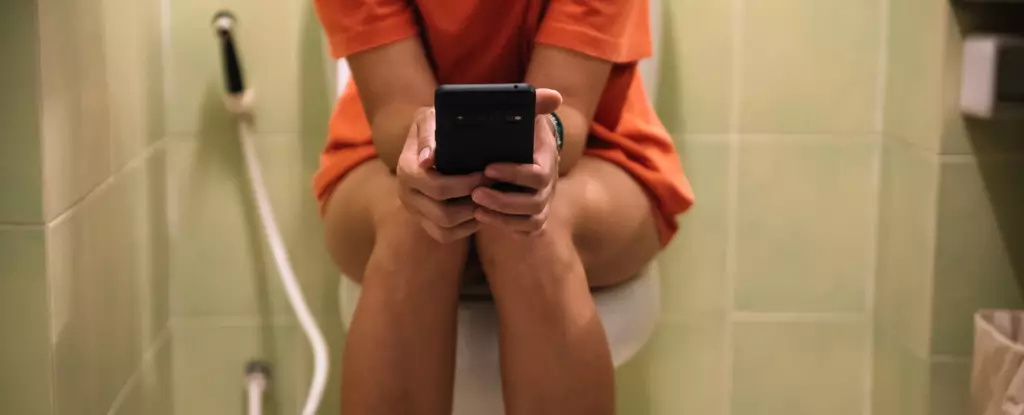Once upon a time, the bathroom was solely a sanctuary for fulfilling biological needs. Fast-forward to today, and it has morphed into a mini-escape where people partake in everything from reading up on world events to scrolling through social media feeds. The reality, however, is that this quilted comfort we derive from our smartphones while stationed on the porcelain throne might be costing us more than we believe. Recent findings reveal that utilizing phones in this vulnerable setting could lead to a staggering 46% increase in the risk of developing hemorrhoids, that uncomfortable and often embarrassing condition that still holds a significant degree of social stigma.
Yes, one could argue that squeezing in a little “me-time” is essential for one’s mental health. However, such indulgences come with a hefty price tag. The notion that our smartphones are facilitating a connection to fabricating knowledge or entertainment while attending to natural bodily functions might seem benign, but this data suggests a shadowy side to our habits that merits deeper exploration.
Instant Gratification: The Downside of Our Digital Age
As we increasingly immerse ourselves in an online world, are we detaching from tangible elements of our physical existence? Engaging with devices in the bathroom reportedly leads to extended periods seated—which contradicts recommendations from doctors who argue that staying on the toilet for longer than ten minutes invites issues that, while presently understated, are endemic in our society. According to this recent survey presented at the Digestive Diseases Week conference, more than 93% of participants admitted to checking their phones while on the toilet at least once a week. From this pool, more than 40% revealed they had indeed developed hemorrhoids—a disturbing correlation that calls for closer scrutiny.
“But it’s just a few minutes!” some may argue. That’s a dangerous oversimplification. It’s the very cavalier attitude, steeped in instant gratification, that often fuels deeper issues of health and well-being. The bathroom should facilitate a moment of reflection—a sacred space—where one can reconnect with themselves. Yet, instead, it has become a digital playground that not only siphons time but appears to jeopardize our physical health.
The Importance of Our Biological Whims
It’s critical to understand that the human body is not designed to sit for long durations. Sure, the ease of smartphones allows us to pierce through a few news articles or socialize while physically incapacitated. However, this convenience undermines the biological signals our body sends us, urging us to finish our business. What’s particularly alarming is that the survey identifies no correlation between common risk factors like age, sex, or diet and the prevalence of hemorrhoids among this group. Instead, it presents a striking clarity: it is the prolonged digital engagement on the toilet that emerges as a strong contributor to this medical condition.
Afflicted individuals often suffer silently due to the stigma associated with discussing bowel issues. Just when one thought society’s absurdities couldn’t go further, toilet time becomes a topic worthy of uproar. Issues like these push us towards questioning our modern digital habits and demand a reconsideration of the sanctity of everyday rituals, including something as fundamental as relieving oneself.
Redefining the Restroom: Advocating for Disconnection
It is fair to propose that the rise in technology has diluted the essential experiences of our lives. As a society, we’ve traded comfort and quality for convenience and distraction, and as the current data indicates, it has led to unforeseen health hazards. Experts are suggesting we create zones—bathrooms, for instance—free from smartphone interference, allowing these spaces to revert back to their original intentions: a functional, hygienic, and reflective environment.
In an era where excessive screen time is a mounting public concern, it’s worthy to draw attention to the undeniable reality that the act of prolonged toilet sitting alongside phone use is a recipe for a less-than-desirable outcome. Let’s face it: our attention spans have dwindled, and dedicated time for our most natural biological urges has shrunk significantly under society’s revolving demands.
Thus, might we consider making bathroom breaks an oasis of clarity, allowing our bodily functions to take precedence over our digital distractions? As we come to terms with these chronic health conditions that plague countless individuals, it may be high time to reevaluate our relationship with technology, even in the most intimate settings. The question remains: what are we willing to sacrifice in the name of instant gratification, and is it worth the potential fallout?

Leave a Reply